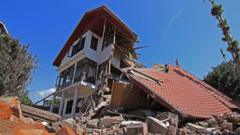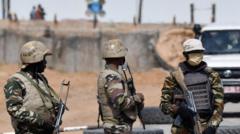*In the aftermath of a deadly assault that claimed 26 lives in Kashmir, Indian security forces have ramped up their actions against alleged militants, which has drawn domestic scrutiny and heightened tensions with neighboring Pakistan.*
**India Intensifies Searches as Kashmir Attack Fallout Grows**

**India Intensifies Searches as Kashmir Attack Fallout Grows**
*Following a tragic attack in Kashmir, authorities demolish homes of suspects while tensions with Pakistan escalate.*
Authorities in Indian-administered Kashmir have taken drastic steps in the wake of a devastating attack that left 26 people dead. Security forces have demolished the houses of at least 10 suspected militants and detained over 1,500 individuals for questioning since the attack occurred near the tourist destination of Pahalgam. Explosives were used in the demolitions, which targeted properties linked to alleged militants, although officials have not publicly elaborated on this strategy. The most recent demolitions took place over the weekend.
Indian officials have accused Pakistan of supporting the militants behind the attack, although no specific group has been blamed. Pakistan has vehemently denied these claims. The tragedy marks the deadliest civilian attack in Kashmir in two decades, reigniting tensions between the two nuclear-armed countries, who have a long-standing and contentious claim over the region.
In the wake of the attack, military responses have been a point of speculation; some anticipate possible strikes against Pakistan similar to past actions following militant incidents. Prominent political figures in Kashmir have expressed concern regarding the demolitions, urging the need to differentiate between terrorists and innocent civilians.
Indian police have identified three of the four suspected attackers, confirming that two were Pakistani nationals and one a local. The fourth suspect remains unknown, and reports suggest that those targeted in the attack were specifically Hindu men. Prime Minister Narendra Modi has pledged to pursue justice for the victims, stating the attack was aimed at undermining peace in the region.
As tensions rise, diplomatic relations between India and Pakistan have soured further, with both countries taking retaliatory actions. India has suspended significant treaties related to water sharing, while Pakistan has reciprocated with its own measures. Amid these escalations, talks of potential military conflicts loom over the Line of Control, as both nations have reported instances of gunfire in the disputed area.
In addition to the political and military maneuvers, there has been an alarming increase in reported threats against Kashmiri students studying in various parts of India, further complicating the already fragile social fabric of the region. The international community, including the United States and the United Kingdom, has urged both nations to seek a peaceful resolution to the ongoing turmoil.
Indian officials have accused Pakistan of supporting the militants behind the attack, although no specific group has been blamed. Pakistan has vehemently denied these claims. The tragedy marks the deadliest civilian attack in Kashmir in two decades, reigniting tensions between the two nuclear-armed countries, who have a long-standing and contentious claim over the region.
In the wake of the attack, military responses have been a point of speculation; some anticipate possible strikes against Pakistan similar to past actions following militant incidents. Prominent political figures in Kashmir have expressed concern regarding the demolitions, urging the need to differentiate between terrorists and innocent civilians.
Indian police have identified three of the four suspected attackers, confirming that two were Pakistani nationals and one a local. The fourth suspect remains unknown, and reports suggest that those targeted in the attack were specifically Hindu men. Prime Minister Narendra Modi has pledged to pursue justice for the victims, stating the attack was aimed at undermining peace in the region.
As tensions rise, diplomatic relations between India and Pakistan have soured further, with both countries taking retaliatory actions. India has suspended significant treaties related to water sharing, while Pakistan has reciprocated with its own measures. Amid these escalations, talks of potential military conflicts loom over the Line of Control, as both nations have reported instances of gunfire in the disputed area.
In addition to the political and military maneuvers, there has been an alarming increase in reported threats against Kashmiri students studying in various parts of India, further complicating the already fragile social fabric of the region. The international community, including the United States and the United Kingdom, has urged both nations to seek a peaceful resolution to the ongoing turmoil.























